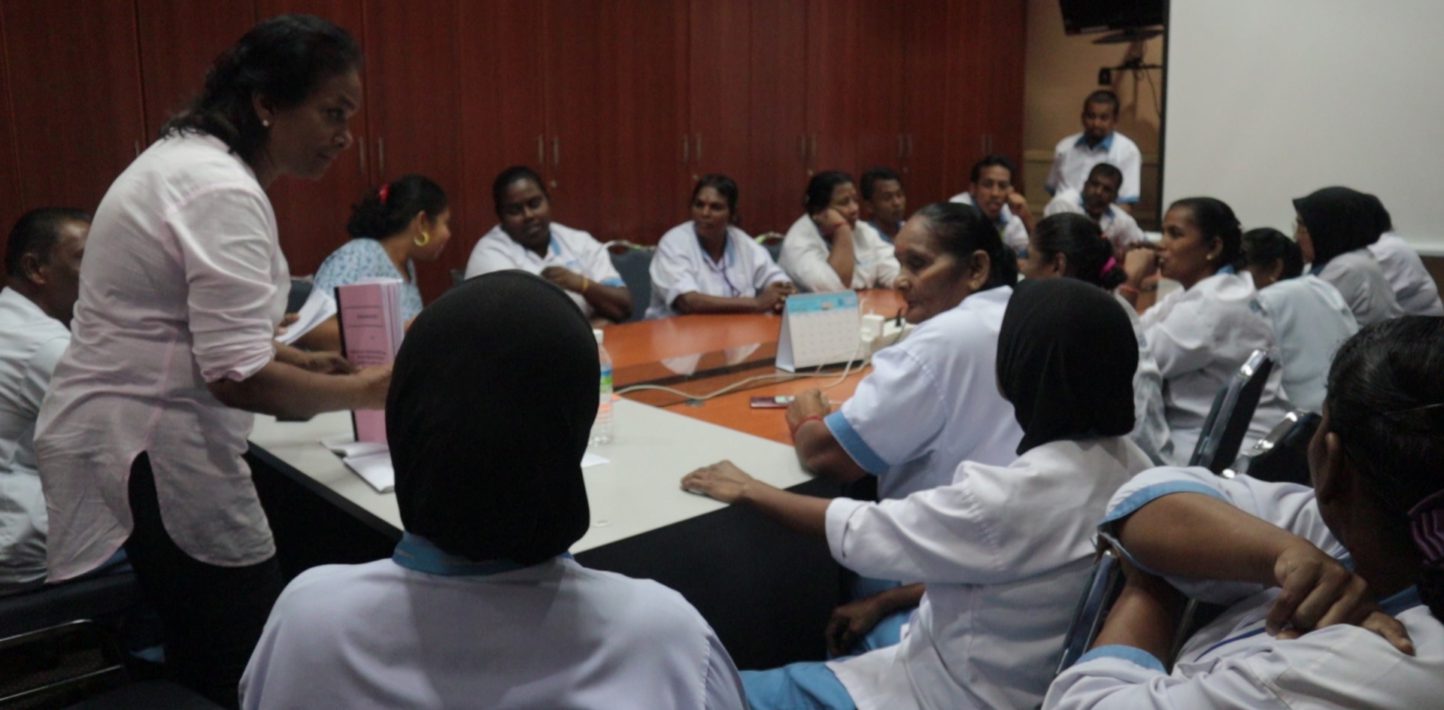Union activists M Sarasvathy, L Danaletchumy, V Santhiran, P Jothi, and C Subramaniam Raja who picketed for hospital cleaners to be paid decent wages, and to be given proper personal protective equipment (PPE) remain at risk of being fined RM1000 and/or imprisoned for six-months. Amnesty International Malaysia is calling on the Attorney General, Tan Sri Dato’ Sri Idris Harun, to drop charges against these union activists. At time of writing, over 4000 letters in support of the activists have been sent to the Attorney General, echoing the call for the charges to be dropped.
“Hospital cleaners are and should be considered frontline workers in our fight against the COVID-19 pandemic like all other healthcare workers. Malaysia’s handling of the pandemic cannot only be attributed to medical staff alone. Hospital cleaners place themselves in harm’s way every day to ensure that our healthcare facilities are clean and sanitised for use,” said Katrina Jorene Maliamauv, Executive Director of Amnesty International Malaysia.
On 2 June 2020, police arrested the five activists outside Hospital Raja Permaisuri Bainun in Ipoh, Perak. The activists had staged a small picket of less than twenty people, protesting the lack of annual increase in wages, lack of increase in sick leave and annual leave according to working seniority, and reduced number of paid public holidays, as well as unfair treatment of union members and insufficient personal protective equipment (PPE) for the cleaners. The five activists were charged with allegedly violating the Prevention and Control of Infectious Diseases (Measures within the Infected Local Areas) Regulations 2020, despite having their temperature taken, wearing face masks and observing physical distancing.
After their arrest, the activists also claimed that they faced mistreatment at the hands of the police while in lockup including verbal abuse, being forced to change into lockup attire with the door open, and being refused water for their personal medication.
“It is a grave injustice that those who fight for basic rights are subject to criminal penalty. These charges are a violation of freedom of association and assembly. Restrictions on rights in a global health crisis must be proportionate to the aims of addressing the crisis. The pandemic cannot be used as an excuse to crackdown on these freedoms, especially when they concern the rights of the very people we rely on to get us through this pandemic,” continued Maliamauv.
A tweet of a video clip from the documentary “Bila Kami Bersatu”, featuring an older hospital cleaner asking “why can’t people like us get a raise?” has been retweeted over fifteen thousand times, and gained almost five hundred thousand views.
“Thousands of Malaysians have expressed shock on social media over the treatment the cleaners have alleged, and rightfully so. The government needs to investigate and address the issues raised by the cleaners and activists, not punish them for claiming their rights. As we mark Malaysia Day, we need to step up in support of the workers who keep this country moving, and the cleaners who keep us safe. They deserve to have their health protected, they deserve a decent living wage, and they deserve their rights and dignity upheld,” concluded Maliamauv.
Background
The hospital workers are contract workers hired by companies subcontracted by the government to provide cleaning staff to hospitals around Malaysia.
In 2016, the National Union of Workers in Hospital Support and Allied Services (NUWHSAS) was revived to negotiate more favourable terms of employment with their employer and they developed a collective agreement of 43 demands.
In October 2019, a new collective agreement of 38 demands was agreed upon with their employer and was slated to take effect in January 2020. However, before the agreement came into force, the subcontract was sold off to a different company, UEMS Edgenta who has refused to honour the previous collective agreement.
UEMS Edgenta also faces allegations of union busting including:
- Changing the working hours and shifts of workers active in the union;
- Arbitrarily transferring union members to hospitals far from their residence;
- Forbidding union-related discussion between union worksite committees and workers, even during break times;
- Disallowing union members from working overtime to increase their earnings;
- Intimidating and threatening union members with disciplinary action.
The company denies these allegations.
As contract workers, cleaners are often only paid the bare minimum monthly wage of RM1,200 and are not entitled to receive benefits such as annual pay rises, more than 11 days of paid public holidays, bonuses, and compensation if they are ever laid off. Some of the hospital cleaners have worked over twenty years, and still receive the minimum wage.


